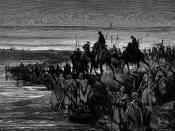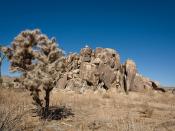Israelite Entry into Canaan
The history of the Israelite settlement of Canaan has been subject to a great deal scholarly debate. Because of discrepancies found within the biblical accounts and a collection of controversial archeological findings the exact history of the formation of an Israelite nation remains unsettled. While the book of Joshua embodies an accurate account of the Jewish cultural memory, scholarly analysis and archeological findings place more truth in a historical narrative more closely congruent to the account provided in the book of Judges. I will examine the conventional narratives as presented in the Bible as well as analyzing the theories and archeological findings as discussed in Callaway's essay "Settlement of Canaan."
The Bible houses two accounts of Israelite settlement: the book of Joshua, and the book of Judges. First of all, it is important to note that although the events surrounding Israelite settlement most likely occurred during thirteenth century B.C.,
it is unlikely that either Joshua or Judges was written that early. Callaway explains that "the traditions preserved in both Joshua and Judges are passed down through the generations. They reached their current form after the Israelites came to possess the land." (Callaway/Miller, pg57) The books themselves imply this time lapse by the use of the phrase "to this day." Throughout the biblical expositions an event is concluded with the telling of the outcome and the idea that the outcome has remained that way over a period of time, e.i. "to this day." Thus we as historians must remember that biblical accounts cannot be taken as literal truth and that sometimes discrepancies can be found.
Although there are inconsistencies between the two books, extremely important basic similarities give historians a general idea of what happened. In both accounts the Israelites are not initially in power, but ultimately...


